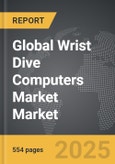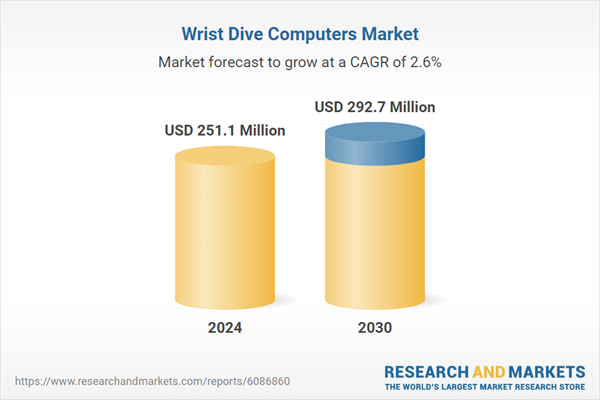Global Wrist Dive Computers Market - Key Trends & Drivers Summarized
Why Are Wrist Dive Computers Becoming Essential Equipment for Recreational and Professional Divers?
Wrist dive computers are rapidly becoming indispensable tools in both recreational and technical diving, driven by the growing emphasis on underwater safety, convenience, and real-time data tracking. As more individuals take up scuba diving for sport, exploration, marine conservation, and underwater photography, the demand for intuitive, compact, and high-performance dive gear has surged - placing wrist-worn dive computers at the forefront. These devices function as underwater command centers, offering critical real-time information on depth, dive time, decompression limits, ascent rate, and gas mixtures, reducing the risk of decompression sickness and improving dive planning. Unlike traditional console-based dive computers, wrist models are more ergonomic and easier to access during complex dives. Their rising popularity is also attributed to a global increase in diving tourism and adventure travel, particularly in coastal destinations across Southeast Asia, the Red Sea, and the Caribbean. Regulatory bodies and dive certification organizations are increasingly recommending or requiring the use of personal dive computers during training and professional dives. Furthermore, as underwater environments become more technically demanding - such as cave, wreck, and deep-sea diving - the precision, multi-gas capabilities, and decompression algorithms offered by modern wrist dive computers are proving essential. Together, these factors are transforming wrist dive computers from optional gear into a vital standard for serious underwater exploration.How Are Technological Advancements Enhancing the Capabilities of Wrist Dive Computers?
The wrist dive computers market is being significantly advanced by continuous technological innovation aimed at improving functionality, accuracy, and user experience. Manufacturers are incorporating cutting-edge features such as color OLED displays, touchscreen interfaces, and customizable dive modes to enhance visibility and control, even in murky or deep conditions. Algorithms have evolved to accommodate various dive profiles and gas mixtures, including trimix and nitrox, with real-time decompression tracking based on multiple models like Bühlmann ZH-L16 and VPM-B. Bluetooth and Wi-Fi connectivity now enable seamless data transfer to smartphones, tablets, and cloud platforms, allowing divers to review, analyze, and share dive logs immediately after resurfacing. Integrated digital compasses, heart rate monitoring, and GPS surface tracking are becoming standard in premium models, catering to divers who require greater situational awareness and environmental navigation. Battery performance has also improved, with many devices offering USB rechargeable lithium-ion cells or solar-assisted charging for extended use. Moreover, several wrist dive computers now feature AI-enhanced dive planning and automatic altitude adjustments, ensuring safety in diverse underwater conditions. Some advanced models even integrate air integration via wireless transmitters, enabling tank pressure monitoring directly on the device. These enhancements are not only increasing safety but also making dive computers more versatile and attractive to a broader audience, from hobbyists to technical divers and dive instructors.How Are Market Dynamics, User Expectations, and Industry Standards Influencing Product Evolution?
Shifting consumer expectations and evolving industry norms are significantly influencing the design, functionality, and distribution of wrist dive computers. Divers today are not just looking for technical performance - they also expect compact, wearable devices that offer comfort, stylish aesthetics, and multi-purpose usability. Many models now double as everyday smartwatches with features like step counting, sleep monitoring, and mobile notifications, blurring the lines between sport-specific gear and lifestyle electronics. In parallel, dive resorts, liveaboards, and training academies are standardizing dive computer usage in their programs, increasing baseline demand and encouraging bulk procurement by institutional buyers. From a regulatory standpoint, increased emphasis on diver safety is leading to higher compliance standards for decompression accuracy, display readability, and durability under extreme pressure. Furthermore, the rise of eco-conscious consumerism is influencing brands to focus on sustainable packaging, repairable components, and longer product lifecycles. E-commerce platforms have also transformed the way dive computers are marketed and sold, with online reviews, feature comparisons, and direct-to-consumer models expanding consumer access and product awareness. Professional endorsements, influencer marketing, and user-generated dive footage shared on social platforms are playing a key role in promoting advanced features to wider audiences. With these pressures in play, manufacturers are rapidly innovating and differentiating their offerings through modularity, app integration, and user interface personalization to align with the changing preferences of the global diving community.What Are the Key Factors Driving Growth in the Wrist Dive Computers Market?
The growth in the wrist dive computers market is driven by several factors linked to expanding recreational diving activity, technological integration, and the global emphasis on underwater safety. A major catalyst is the increasing popularity of scuba diving as a mainstream recreational activity, fueled by tourism growth and rising participation in adventure sports across coastal economies. Dive training organizations are reinforcing this trend by mandating or strongly recommending personal dive computers for all levels of certification, thereby creating a consistent demand across beginner and advanced user groups. The diversification of underwater exploration activities - ranging from free diving and spearfishing to deep technical and rebreather diving - is also boosting demand for specialized wrist computers with customizable features and advanced gas mix support. Another key driver is the integration of wireless connectivity and mobile app ecosystems, which enhance the post-dive experience through data analytics, community engagement, and training reinforcement. Technological miniaturization and improved battery life are making high-end features more accessible in mid-range models, expanding the market base. Furthermore, the increased availability of rugged, waterproof materials and corrosion-resistant components is enabling manufacturers to cater to both saltwater and freshwater diving conditions. From a commercial angle, the rising number of dive schools, rental shops, and marine research institutions are creating sustained B2B demand. Lastly, growing consumer focus on personal safety, performance optimization, and digital tracking is ensuring that wrist dive computers continue to evolve and expand their footprint within the global diving equipment market.Report Scope
The report analyzes the Wrist Dive Computers market, presented in terms of market value (US$). The analysis covers the key segments and geographic regions outlined below:- Segments: Type (Air Integrated Wrist Dive Computer, Non-air Integrated Wrist Dive Computer); Display (Backlit Display Wrist Dive Computer, Non-backlit Display Wrist Dive Computer); Memory (Up to 50 Hours Memory, 51 to 100 Hours Memory, Above 100 Hours Memory); Navigation (Wrist Dive Computer with Compass, Wrist Dive Computer without Compass); Distribution Channel (Online Distribution Channel, Offline Distribution Channel).
- Geographic Regions/Countries: World; United States; Canada; Japan; China; Europe (France; Germany; Italy; United Kingdom; Spain; Russia; and Rest of Europe); Asia-Pacific (Australia; India; South Korea; and Rest of Asia-Pacific); Latin America (Argentina; Brazil; Mexico; and Rest of Latin America); Middle East (Iran; Israel; Saudi Arabia; United Arab Emirates; and Rest of Middle East); and Africa.
Key Insights:
- Market Growth: Understand the significant growth trajectory of the Air Integrated Computer segment, which is expected to reach US$181.4 Million by 2030 with a CAGR of a 2%. The Non-air Integrated Computer segment is also set to grow at 3.6% CAGR over the analysis period.
- Regional Analysis: Gain insights into the U.S. market, valued at $68.4 Million in 2024, and China, forecasted to grow at an impressive 4.8% CAGR to reach $56 Million by 2030. Discover growth trends in other key regions, including Japan, Canada, Germany, and the Asia-Pacific.
Why You Should Buy This Report:
- Detailed Market Analysis: Access a thorough analysis of the Global Wrist Dive Computers Market, covering all major geographic regions and market segments.
- Competitive Insights: Get an overview of the competitive landscape, including the market presence of major players across different geographies.
- Future Trends and Drivers: Understand the key trends and drivers shaping the future of the Global Wrist Dive Computers Market.
- Actionable Insights: Benefit from actionable insights that can help you identify new revenue opportunities and make strategic business decisions.
Key Questions Answered:
- How is the Global Wrist Dive Computers Market expected to evolve by 2030?
- What are the main drivers and restraints affecting the market?
- Which market segments will grow the most over the forecast period?
- How will market shares for different regions and segments change by 2030?
- Who are the leading players in the market, and what are their prospects?
Report Features:
- Comprehensive Market Data: Independent analysis of annual sales and market forecasts in US$ Million from 2024 to 2030.
- In-Depth Regional Analysis: Detailed insights into key markets, including the U.S., China, Japan, Canada, Europe, Asia-Pacific, Latin America, Middle East, and Africa.
- Company Profiles: Coverage of players such as 3M Company, Advanced Medical Solutions, B. Braun Melsungen AG, Baxter International Inc., BSN Medical GmbH and more.
- Complimentary Updates: Receive free report updates for one year to keep you informed of the latest market developments.
Some of the 41 companies featured in this Wrist Dive Computers market report include:
- Aqua Lung International
- Atomic Aquatics
- ATMOS
- Cressi S.p.A.
- Deepblu Inc.
- Garmin Ltd.
- Genesis Scuba
- Hollis
- Johnson Outdoors Inc.
- Mares S.p.A.
- Oceanic Worldwide
- Pelagic Pressure Systems (TUSA)
- Ratio Computers LLC
- Scubapro
- Seacsub S.p.A.
- Shearwater Research Inc.
- Sherwood Scuba
- Suunto Oy
- Tabata Co., Ltd. (TUSA)
- Uwatec
This edition integrates the latest global trade and economic shifts into comprehensive market analysis. Key updates include:
- Tariff and Trade Impact: Insights into global tariff negotiations across 180+ countries, with analysis of supply chain turbulence, sourcing disruptions, and geographic realignment. Special focus on 2025 as a pivotal year for trade tensions, including updated perspectives on the Trump-era tariffs.
- Adjusted Forecasts and Analytics: Revised global and regional market forecasts through 2030, incorporating tariff effects, economic uncertainty, and structural changes in globalization. Includes historical analysis from 2015 to 2023.
- Strategic Market Dynamics: Evaluation of revised market prospects, regional outlooks, and key economic indicators such as population and urbanization trends.
- Innovation & Technology Trends: Latest developments in product and process innovation, emerging technologies, and key industry drivers shaping the competitive landscape.
- Competitive Intelligence: Updated global market share estimates for 2025, competitive positioning of major players (Strong/Active/Niche/Trivial), and refined focus on leading global brands and core players.
- Expert Insight & Commentary: Strategic analysis from economists, trade experts, and domain specialists to contextualize market shifts and identify emerging opportunities.
Table of Contents
Companies Mentioned (Partial List)
A selection of companies mentioned in this report includes, but is not limited to:
- Aqua Lung International
- Atomic Aquatics
- ATMOS
- Cressi S.p.A.
- Deepblu Inc.
- Garmin Ltd.
- Genesis Scuba
- Hollis
- Johnson Outdoors Inc.
- Mares S.p.A.
- Oceanic Worldwide
- Pelagic Pressure Systems (TUSA)
- Ratio Computers LLC
- Scubapro
- Seacsub S.p.A.
- Shearwater Research Inc.
- Sherwood Scuba
- Suunto Oy
- Tabata Co., Ltd. (TUSA)
- Uwatec
Table Information
| Report Attribute | Details |
|---|---|
| No. of Pages | 554 |
| Published | February 2026 |
| Forecast Period | 2024 - 2030 |
| Estimated Market Value ( USD | $ 251.1 Million |
| Forecasted Market Value ( USD | $ 292.7 Million |
| Compound Annual Growth Rate | 2.6% |
| Regions Covered | Global |









